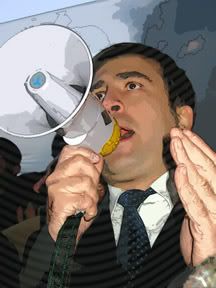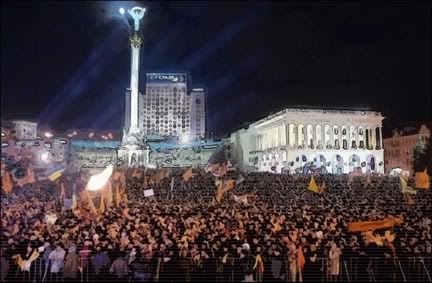Adam Larson
Caustic Logic / Guerillas Without Guns
2/25/07
On the day before the election, November 18, small rallies of a few hundred Saakashvili supporters each were reported in cities across Georgia. The crowd at Zugdidi swelled to thousands on Election Day as they prepared to mobilize, led by Misha himself under the plan to march halfway across the country and into his capital to claim the election victory. [1] The march was delayed to allow more time to prepare, but the procession finally snaked its way along the rough route of the BTC line and arrived in Tbilisi like an invading army on the 20th.
In the meantime, the election had been called in the President’s favor, as expected, so the opposition swarms took up positions around the parliament building and dug in for a fight. Others joined from Tbilisi itself and other cities; over 100,000 people were bused in from the countryside in an operation organized by Kmara, who also set up loudspeakers and a giant television screen amid the crowds. [2] For three days the downtown area was a thriving hub of human energy, protesting, networking, and listening to speeches by opposition leaders. The Rose Revolution that thus formed took its name from the roses Saakashvili and his supporters handed out to symbolize their nonviolent intent and the beauty of the transformation at hand. The opposition prima donna reportedly waved a long-stemmed rose in Shevy's face at one point, shouting “Resign!” [3]
The opposition to the opposition also mobilized. On the day before the election an estimated 10,000 supporters of the Revival party boarded chartered buses in Batumi, capital of the contested autonomous region of Ajaria. Ajaria’s de facto president Aslan Abashidze was normally a Russian-leaning opponent of Shevardnadze’s but was willing to form an alliance to keep Saakashvili out of power; he had just toured Armenia, Azerbaijan, and Russia on the President's behalf to bolster support from those countries' leaders. [4] The Revival activists were soon marching on Tbilisi’s streets to counter Kmara and its allies, with 600 of them keeping a night vigil in front of parliament. [5] The head of Revival's Tbilisi branch told reporters “we demand that the whole of Georgia stand united under a single motto: ‘No to fascism, No to extremism, No to civil confrontation.’ Let us all defend Georgia's constitutional order and respect the legitimacy of the state.” [6]
 |
Inside the chamber, the usurper Saakashvili declared dramatically “the velvet revolution has taken place in Georgia!” Meanwhile the President gathered with supporters in the cold outside the building telling them “I will only resign by constitutional means.” He declared a state of emergency amid what he called an attempted coup d'etat, and withdrew to the presidential palace where security had been beefed up. Opposition leader and Saakashvili ally Nino Burjanadze announced assumption of the presidency until things sorted themselves out.
Later in the afternoon, Misha called Shevy and told him he could stay in office for a transitional period if he only agreed to early presidential elections. Twenty minutes later, a crowd stormed the palace, apparently a reminder that he had little choice. [10] The whole thing had begun as a wrangle over parliamentary elections, but now a referendum on the presidency itself was forced onto the agenda. At the end of the day, what happened looked suspiciously like a CIA-sponsored coup of days past, this time simply masked by the popular uprising of the Rose Revolution and the coronation was to be by popular demand.
| 2004: Miles awarded the State Department's Robert C. Frasure Award for “peaceful conflict resolution.” 2005: ends his tenure as US ambassador in Tbilisi. March 2006: nominated Executive Director of the Open World Leadership Center, a Congressional body founded in 1999 to bring emerging economic, political, and cultural leaders from Russia, Ukraine, etc. to study in the US. |
Some remained faithful to Shevardnadze even after all this. Aslan Abashidze’s “fiefdom” of Ajaria refused to recognize Saakashvili, and Tbilisi responded by imposing sanctions and closing off the border. Fearing an invasion, Abashidze blew up the bridges into the region in May, but was finally forced – by mass protest, of course - to step down and flee to Russia. [13] Batumi was at the time host to a dozen Russian Military bases, but after the mini-revolution there, Tbilisi has pushed for their removal, reaching an agreement with Moscow in 2005 that all Russian forces will be withdrawn by 2008. [14]
Abashidze’s self-imploding show of diehard support was too little too late to save Shevardnadze’s power. The ousted President was reportedly “stunned” by what he perceived as Washington's betrayal. “I was one of the staunchest supporters of the U.S. policy. When they needed help on Iraq, I gave it,” he lamented. “I don't have an explanation to what has happened here.” [15] Almost certainly the answer lies in his relationship with Russia. He’d been sent to Tbilisi in 1992 by Moscow, after all, and if he’d been allowed to observe the scale of the American offensive in the former Soviet space that soon unfurled, Moscow-Tblisi relations could well have thawed even to the melting point. But for whatever reason, he was taken out of the game first. He did not go into exile, though he was invited by the Germans, and remains free though in forced retirement in his homeland.
Saakashvili’s desired early election came a little over a month after he demanded it, on January 4, 2004. It must be noted that with five-year terms and Shevardnadze’s last election in April 2000, the next election wasn’t set until some time in 2005. Thus with elections called at least a year in advance, the Rose Revolution’s leader took in a whopping 96 percent of the vote, a stunning result even with a narrowed playing field in which the parties had no time to field strong candidates. Such results, if pulled by any other post-Soviet despot, would be taken as a sure sign of fraud in what nearly everyone calls a divided and fractious country that had after all hosted large anti-Saakashvili protests even before he took the capital and pushed his speedy coronation. Yet Western observers batted nary an eyelash as he claimed only 4% of the country voted against him, and simply took the results as a simple display of the man’s overwhelming popularity


No comments:
Post a Comment